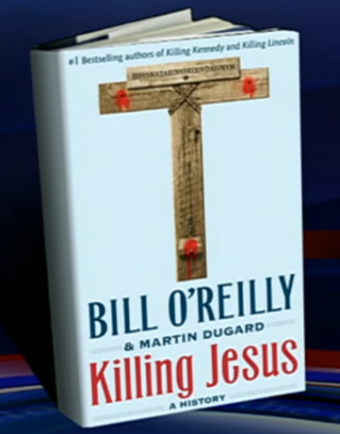CURRENT AFFAIRS
Killing Jesus A Review

While much has been made about the book (and its author, a political firebrand on the Fox News Channel) and about its historical accuracy and sub-political agendas that O'Reilly may or may not have been trying to forward, it is the desire of this reviewer to give a reasonably fair picture of this book, yes, from the evangelical point of view, but with a strong desire to get the story right! I am not, nor have I ever been, a huge O'Reilly fan and do not want to seem as if I am defending him. I read this book with an open mind and tried to remove any of my theological/evangelical leanings.
That being said, this really is not the worst biography of Jesus that mankind has ever written. I noted that, as a Christian, I kept wanting O'Reilly to go deeper. I know why Jesus came to die — it was God's sovereign will to redeem all of humanity. Say that, O'Reilly! But that is not really the point here. The authors' purpose here is to merely examine the life, times, and events leading up to this crucial moment in the life of this crucial figure in history.
We in the church seem to forget sometimes that Jesus was a real, live human being living, eating, breathing, playing, socializing, and discussing in a real-world environment with real-world situations. Jesus was real — as real as you and I — and His world, though different, had many similarities to ours. This is what O'Reilly and Dugard are trying to communicate, not a theological discussion of the atonement. The authors deal with what we know from history and what we can reasonably deduce from history. This is apparent in their treatment of the Resurrection. This is a HUGE moment in Christianity, but, dear Christian, go find hard historical evidence that the Resurrection happened. There's not much, and O'Reilly's version of these events relies on what we do know. (Note: I am not a skeptic! There was a bodily Resurrection! Please save your comments!) It's not fair to ask a book that has no theological pretense to wax poetic on the implications of the Resurrection.
The main crux of the book is that Jesus died at the hands of political opportunists who were fearful of losing their power and their money because of a provincial "rebel." I ask, and O'Reilly and Dugard implicitly ask, that we lay aside our theological training and ask ourselves, honestly, doesn't this make sense when we read the Gospel accounts? Of course, the Jewish authorities were upset and threatened. Look at what Jesus had done to them for 3 years and then what He had most recently done in "their" temple during "their" biggest time of the year. Let's put aside the fact that Bill O'Reilly can be a little "out there" and ask ourselves, "Doesn't he make a good point?" Yes, we as Christians know that God sovereignly ordained all of this to happen, but doesn't political intrigue fit the narrative, too? Couldn't God have designed it to be this way? I think it beyond question that because Jesus of Nazareth threatened the pocketbooks of some in power, He was detained illegally, beaten, perjured against, and made to be a pawn in a political chess game between the Sanhedrin and Pilate. In my opinion, this seems to be a feasible way that God could have conducted His plan for our salvation. Given what we know of human nature and that period of time, it seems almost certain that the basic events during the Passion Week had political and economic undertones.
Were there some parts of the book that I found to be wrong or questionable? Sure. However, I will admit that they were minor and did not detract from the story. As noted, I kept wanting O'Reilly to go deeper and say more, but that was never really the point of the book, and, as a Christian with an interest in theology and apologetics, I had to leave that part aside and enjoy the read.
And that is the main point I would drive home here. This is not a book to give to someone who is seeking to know more about Christ's death and what it means in his/her life. It does not address the meaning of Christ's death nor does it attempt to do so. It is not a book to use for deep and serious research into the life of Christ. If you're an "armchair theologian" and the history of the Church interests you, or you'd just like a good read, this hits the spot nicely. The book is widely read — it debuted #1 on the New York Times Best Sellers list. I would say that Christians should read it if only to enjoy a story we all know, told from a slightly different angle than your church's annual Passion Play. Plus, the book is bound to come up in conversation with people who are seeking Him.
Tags: Controversial-Issues | Current-Issues | History-Apologetics | Jesus-Christ
comments powered by Disqus
Published 1-14-15

